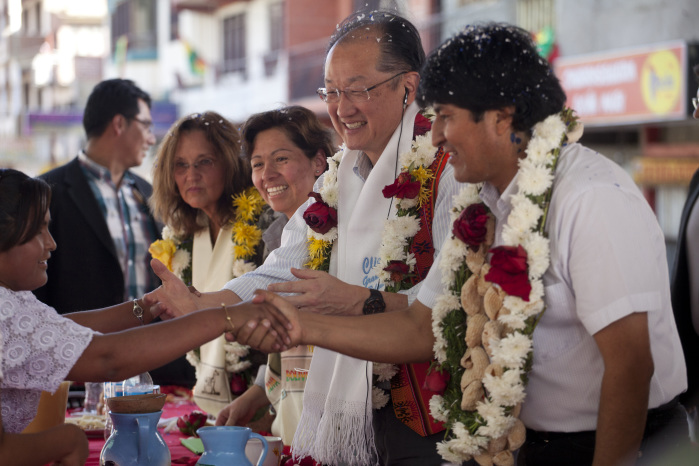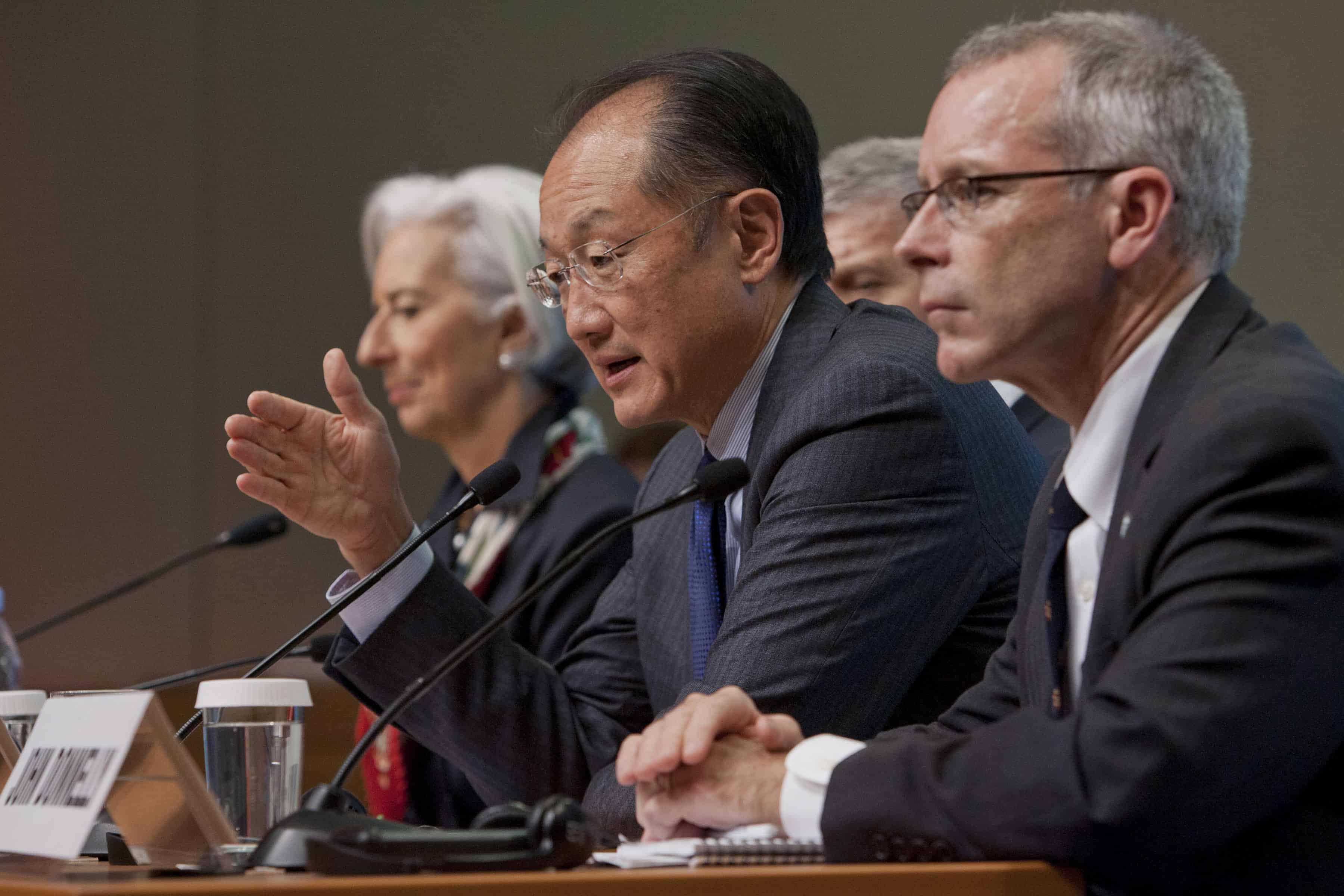WASHINGTON, D.C. – After Dr. Jim Yong Kim graduated from college in 1993, his first trip to Washington was to join a noisy protest against the World Bank.
“I was part of a group called ‘Fifty Years is Enough.’ We said they should just close the institution on its 50th anniversary,” he said. “I’m very glad we lost that argument.”
Kim, now president of the World Bank Group, says it’s a very different institution than it was 20 years ago – one that focuses as much on health and education as on foreign investment. On Wednesday, the Korean-born physician used his position of authority to convince representatives of 34 nations that they must do more to erase social inequality throughout the hemisphere.
“We’ve seen that equality of access to basic goods and services has improved in recent years. Yet serious concerns remain in many countries regarding their quality, particularly in education, health, housing and other infrastructure,” said Kim, giving the 55th Lecture of the Americas at the Washington headquarters of the Organization of American States.
Kim noted that the region’s economy would grow by 2.5 percent in 2014, which is lower than GDP growth recorded in either 2012 or 2013.
“Although some of our countries have made dramatic gains, in spite of that, at the beginning of this century, we still have several challenges,” he said. “As with poverty reduction, most of the progress in expanding access to basic services since 2000 has been in the Southern Cone and the Andean regions, while many Central American countries managed only small improvements. Several Caribbean nations have problems of indebtedness that could hinder their ability to provide quality services to all citizens.”
Kim, who was introduced by OAS Secretary General José Miguel Insulza, noted that in the last 10 years, poverty has fallen by half, and that today only 12.3 percent of the region’s inhabitants live below the poverty line.
“The middle class – currently 34 percent of the population – is growing,” he said, adding that for the first time in history, Latin America has more middle-class than poor inhabitants. “Meanwhile, inequality in Latin America, historically the world’s highest, has fallen, even as it rises in practically every other part of the globe.”
Yet he warned that over the last two years, growth in the region has slowed “as a result of rapidly changing global circumstances” including declining prices for export commodities. At the same time, reductions in inequality have stagnated and in fact have started edging back up in a few countries.
“To boost growth, Latin America needs to increase productivity, spur innovation, and adapt its productive structure to changing circumstances. This must become a national priority for all countries, independent of their political cycles and ideologies,” Kim warned. “The social gains of the last decade hang in the balance.”
Between 2000 and 2011, he said, social spending as a share of GDP rose from nearly 12 percent to 14.5 percent, while public spending on education edged up from 3.9 to 5 percent. At the same time, health spending went up from 3 percent to nearly 4 percent, according to a study of 18 countries.
“Similarly, the number of countries in the region with conditional cash transfer programs expanded to 18, while non-contributory pension systems blossomed throughout the region, giving millions of people the opportunity to save for the future and retire with dignity,” he said.
To finance spending on conditional cash transfers, the region increased tax collection from 16 to 20 percent of GDP between 2000 and 2010, he added.
“And importantly, these revenue gains came primarily from more efficient tax collection and a broadening of the tax base, rather than hiking taxes on businesses and crimping their ability to expand and create jobs,” said Kim, singling out Chilean President Michele Bachelet for “moving forward with an ambitious reform agenda to boost shared prosperity among all Chileans.”

The World Bank chief recalled his first visit last year to Bolivia, and his meeting with President Evo Morales – an avowed enemy of capitalism. He and Morales even played an impromptu game of soccer in an isolated Andean village 3,800 meters above sea level.
“As I was trying to keep up with President Evo on the soccer field, some of the Uruchipaya villagers who were watching us were snapping pictures on their smartphones. This was one of the most remote parts of Bolivia, and even there, people have access to technologies that connect them to the wider world,” he said. “That lesson for me was powerful. Though excluded from economic progress and largely invisible to the rich world, the poor are very aware of how the rich live. And, with that knowledge, they’re demanding more opportunity for themselves, and especially for their children.”
Following his lecture, a member of the audience asked Kim how he sees the World Bank’s role in countries that label the bank an arm of capitalism.
“I made it clear to Morales that I was not there to give any prescription or set conditions, but to work with him to help Bolivia achieve the greatest aspirations for his people.” Kim responded. “We will work with any country in the world, as long as we have something to offer. I’m talking now about the possibility of eventually working in North Korea, the country of my father’s birth. This isn’t about ideology. It’s whether we can bring value to the table.”
In fact, North Korea and Cuba are the only two nations that don’t belong to the 188-member World Bank or the International Monetary Fund.
“There really isn’t a single country in the world that cannot improve its public spending,” he said. “We work very hard at encouraging countries to focus their efforts on things that will make a difference. General subsidies are very regressive; they help people who don’t really need help. We think that instead, social expenditures should be focused on the poorest.”
La Celia Prince, ambassador of St. Vincent and the Grenadines, then told Kim that many small Caribbean nations such as hers are suffering from indebtedness – a curse she said “is exacerbated by the policies of the World Bank to graduate many of these countries from concessionary financing.” Prince asked Kim if his bank would consider criteria other than per-capita GDP when setting interest rates.
“We are a collective of 188 member nations, and among those 188 nations we have tremendously varying views about the direction the World Bank should go,” he replied. “It’s really important that we set certain rules about when countries graduate.”
Kim added that changing the cutoff for eligibility for preferential World Bank treatment is “very difficult politically” – and that the decision is not up to him alone.
“We’ll do everything we can to help countries manage their debt more effectively. But some countries are facing very difficult circumstances right now,” Kim said. “Defaults could have far-reaching impacts across the region and we don’t want that to happen, but we’ll take it case-by-case in situations where there are real emergencies.”
He added: “But if we do something special, it will also require the country to do something special – and that will require very tough sacrifices.”







